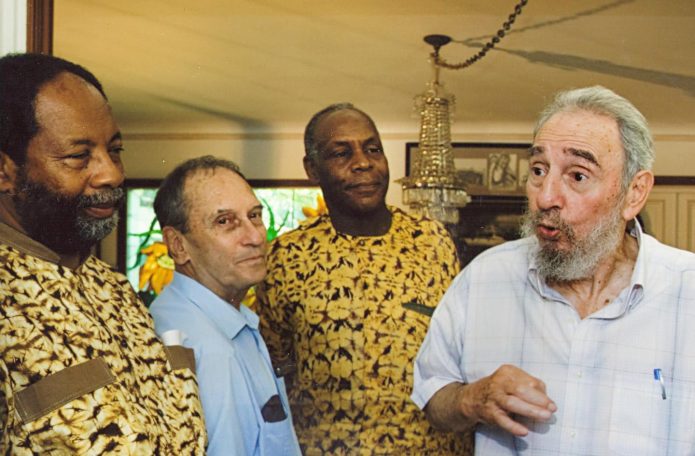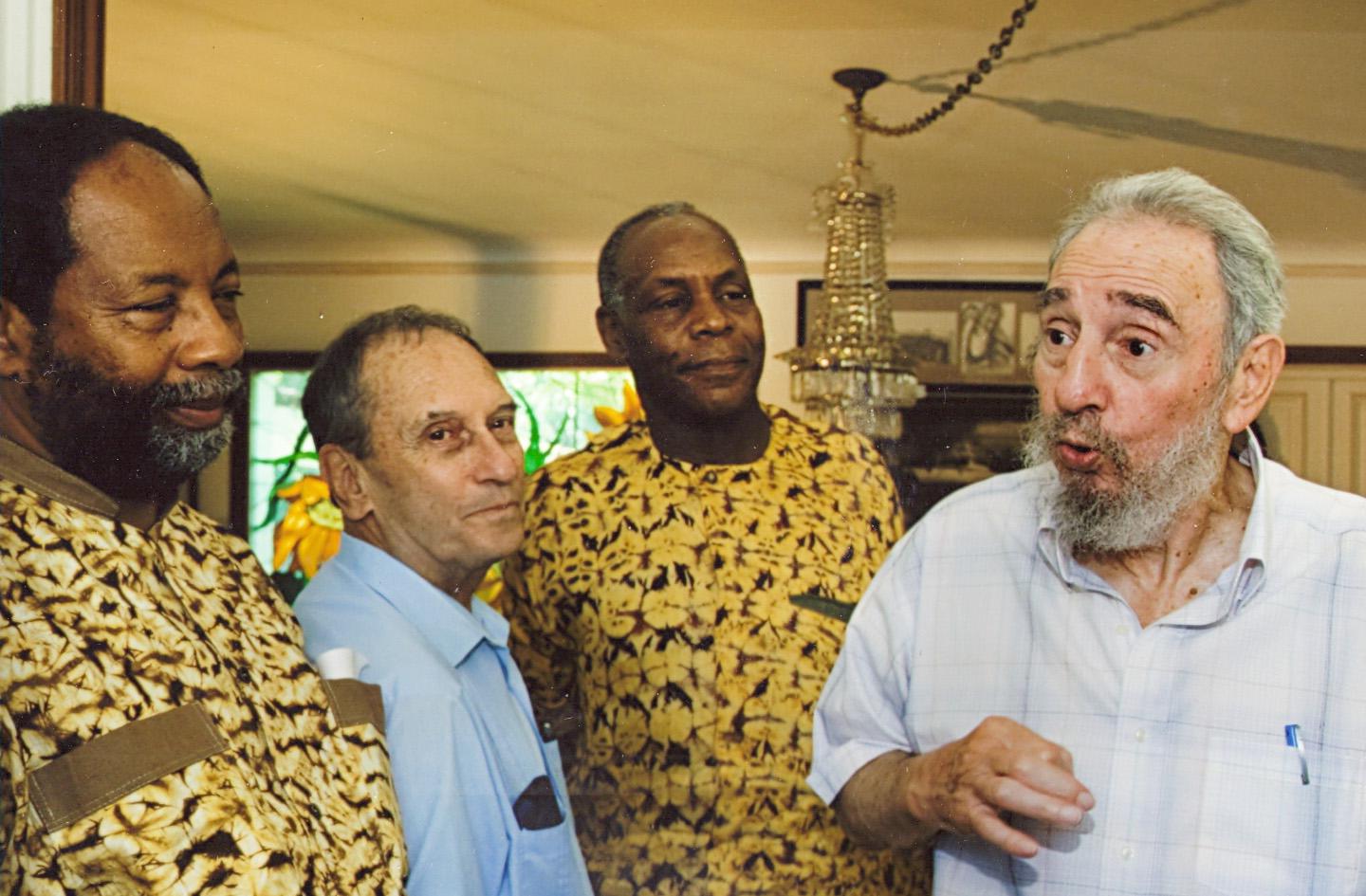
Picture: IPS board members James Early and Saul Landau, with actor Danny Glover and Fidel Castro.
The driver weaved through the maze of two lane roads just west of Havana. He turned into a driveway lush with green tropical flora, a small swimming pool and a modest, well tended four bedroom home.
Kids from about eight to twenty-something (grandchildren) awaited the small group of Americans. Some older adults, including his youngest son and wife, Dalia, also greeted us. Fidel, dressed in his now ubiquitous dark blue track pants and a short-sleeved light blue sport shirt, greeted us enthusiastically. His gray hair and beard have grown thinner, but still stand as defining features to his six foot plus stature.
After a hug to the visitors and me, he held up the transcript of the last film we did (“The Uncompromising Revolution,” in late 1987, shown on public television in 1990). He whispered: “You asked many hard questions. In retrospect, I see that some of them were quite appropriate.”
He looked comfortable and vigorous at 83 years, even after recuperation from abdominal surgery and peritonitis. He described the after effects of the fall he took in 2005, when he missed a step descending from the platform after delivering a speech. “I suffered multiple fractures in the knee,” he pointed and then raised his right arm halfway. “And I still can’t bring my arm higher than this as a result of jamming my shoulder in the fall.”
He shrugged. “I didn’t see that last step on a staircase designed to have people fall. But what could one do?” He talked about his new life centered on his thirst for reading and writing. He showed us neat piles of books, magazines and newspapers, and then revealed that his eyesight had for some reason improved. “Read this,” he said to me, handing me the daily Granma and indicating an article in small print. I could not. He could. “You see, I don’t need glasses to read any more.”
“I immerse myself in reading,” he reported, “and I write as well.” (He has published one or more essays each week for more than a year in Granma.) He selected a volume from the neat piles of books, newspapers and magazines. “I’ve read Obama’s books very carefully.” He slowly flipped through the pages of “Dreams From My Father” showing underlining and hand-written margin notes on almost every page.
“A man who shows deep intelligence, with a gift for writing, and obviously good values,” he concluded. “But he is limited in what he can do. He is tied down by vested interests.” I imagined Gulliver thinking his noble thoughts as the Lilliputians chained his arms and legs.
“I used to be a politician,” Fidel said, the understatement of the year. “I can put myself in his shoes. I understand how hard it is to make basic changes.” Trays circulated with cold juice, a welcome treat on a hot and steamy mid September morning. Fidel needed no prodding to launch into the theme that clearly overrides all his other concerns, “the incompatibility of the consumer society and culture.” He stressed the need “to preserve natural resources and energy, which our very species need to survive.” He looked at his U.S. guests and said: “The United States cannot be the model for economic development.”
“Obama understands this and did a courageous thing,” he said, referring to his Administration’s pledge to “make up for lost time” in reaching a global agreement on climate change at Copenhagen in March. “Obama admitted the developed countries had contributed a large part of the destruction.” Fidel referred to scientific reports he had read about the rise in temperature and its impact especially on third world countries, which he noted also contribute to the warming pattern. He referred to the shocking thaw of Greenland’s ice shelves.
His words contained the passion the world has heard from him for half a century, now focused on global survival.
He spoke of “the urgent need for unity to face this crisis based on a culture of understanding climate change; or else, even if some of the scientific calculations are exaggerated, humanity is headed toward tragedy. His words still rang with optimistic tones as he labeled “the societies based on consumption and waste of resources” incompatible with real economic development growth and a healthy planet.
As he spoke, I looked at his family, some of whom were listening, and felt the power that he still radiated. What discipline, I thought, to make the transition from the adrenalin-rush of more than fifty years of leadership under tension, from guerrilla warrior to head of revolutionary state, and into comfortable retirement, reading, writing widely read essays and hanging out with grandkids.
